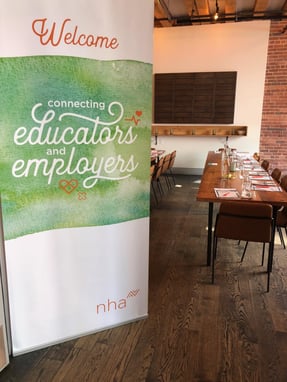NHA recently hosted a roundtable discussion with allied health educators and one of the largest employers of medical assistants in the United States. We discovered opportunities to work more closely, share information and create a network to support allied health students becoming employed professionals faster — and with the right sets of skills.
Not only was it a great learning experience for everyone who attended, but there were some takeaways we wanted to make sure we passed on to our certification holders, candidates and educators across the country. Below are some themes we uncovered at our most recent employer-educator summit.
Both Educators and Employers Play a Role in Helping Students Understand the Value of Certification — Beyond Passing the Exam
Across all the roles represented — academic deans, vice presidents of human resources, directors of operations, classroom instructors, NHA certification specialists and many more — one thing was clear: we are all passionately committed to empowering students to become professionals who deliver exceptional patient care. A big part of that means making sure excellent certified people are on the frontline of patient care.
Employers want their new hires to succeed and thrive. They know that the only way to deliver great patient experiences is to empower their workers to do what's right. There are even opportunities for medical assistants, and other frontline healthcare workers to advance their career. So taking a step back and thinking about the full arc of your career is a valuable activity. Understand the value of certification, how to maintain it, and how to talk about it during the job search.
Professionalism Skills Will Set You Apart — But They Can Be Tricky to Teach
The human resources representatives all confirmed that professionalism, sometimes called "soft skills" are critical to succeeding in healthcare. This comes as no surprise to educators. Professionalism is critical to success in many areas of a person's life. The call-to-action for us at NHA and for health science educators is to make sure we provide as many resources and tools to help students understand what the expectations are and why.
Luckily, NHA has resources for building these skills. For candidates preparing for their exam, "professionalism tips" are built into online study materials. Classroom instructors have to make sure their students are prepared with the hard clinical skills required to take their exam and enter the profession.
The professionalism skills are being taught too. Why do you think there are assignment deadlines? Because at work you have to make sure things get done when they need to be. Ever get a letter grade lower for being late to class? Being on time is important in school but showing up on time every time at work can mean the difference between patients getting the care they need or not. Let these lessons sink in while using the tools built into NHA study materials and other articles on professionalism.
An Externship Partnership Between a School and Employer May Be a Few Phone Calls Away
A big reason why educators wanted to join the summit was to learn about how to improve or start externship programs at their schools. What can educators do to get the conversation going?
- Find the right person to talk to. This could be someone in HR or it could be someone in clinical operations.
- Be prepared with information on the school's curriculum and amount of students who need to be placed in externships.
- It may be easier at larger health systems than individual practices.
- If there is hesitation, ask what your school could do to facilitate a good partnership.
Employers Are Looking for Candidates Who Understand "Why" Not Just "What"
It's vital that a healthcare employee understands and can successfully accomplish their tasks on the job. However, knowing what to do and why to do it are two different things. Employers want candidates who understand when to flag patient vital signs for escalation — it helps save lives.
So how can you be prepared? Be curious! Ask questions about what different things mean, not just how to report them. Instructors can help their students by encouraging them to understand what they're doing beyond the task itself. Knowing the bigger picture can also help if you are interested in moving to a more advanced role one day, like a supervising medical assistant, or even a practice manager.
Get Involved in the Discussion

We at NHA had such great feedback about this event. We are excited to be able to bring it to a few more cities this year.
Are you interested in attending an educator-employer summit in your city? Do you think someone in your organization should be at the table networking with the employers in your area?
Sign up and we will let you know the next time we will be hosting an event near you.



